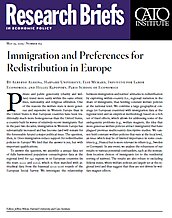Private and public generosity (charity and welfare) travel more easily within the same ethnic lines, nationality, and religious affiliation. One of the reasons the welfare state is more generous and expensive in Western Europe than in the United States is that European countries have been traditionally much more homogeneous than the United States, a country built by waves of relatively recent immigrants. But in the past two decades, immigration in Western Europe has substantially increased and has become (and will remain for the foreseeable future) a major political issue. The question, then, is: Does immigration reduce support for redistributive policies in Europe? We find that the answer is yes, but with important qualifications.
To answer the question, we assemble a unique data set of fully harmonized population census/register data at the regional level for 140 regions in 16 European countries (in the years 2000 and 2010), which is then matched with attitudinal data from the biannual 2002–2016 rounds of the European Social Survey. We investigate the relationship between immigration and natives’ attitudes to redistribution by exploiting within-country (i.e., regional) variation in the share of immigrants, thus holding constant welfare policies at the national level. We combine a large geographical coverage (16 European countries) with immigration data at the regional level and an empirical methodology based on a rich set of fixed effects, which allows for addressing some of the endogeneity problems (e.g., welfare magnets, the idea that more generous welfare policies attract immigrants) that have plagued previous multicountry descriptive studies. We cannot hold constant welfare policies that vary at the local level, an issue that may be of limited importance in some countries (e.g., France) but is more relevant in others (e.g., Sweden or Germany). In any event, we analyze the robustness of our results to various potential confounders, such as the nonrandom location choices of immigrants (or to the residential sorting of natives). The results are also robust to excluding federal states, where welfare policies are largely set at the regional level and thus suggest that they are not driven by welfare magnet effects.
We first find that local (i.e., regional) exposure to immigrants in the residence region affects natives’ perception of the number of immigrants at the national level and, therefore, also their perception about the identity (natives versus immigrants) of the potential beneficiaries of the welfare state. We then uncover that native respondents in our sample display lower support for redistribution when the share of immigrants in their residence region is higher. This attitudinal effect is sizable in relative terms, in comparison to the effect of individual variables such as education or income that are important determinants of preferences for redistribution. For example, the anti-redistribution effect of a one-quintile increase in the immigrants’ share is about half as large as the attitudinal impact of a one-quintile increase in household income.
This average effect hides considerable heterogeneity along a number of dimensions: types of receiving countries, natives’ individual characteristics, and immigrant types. The most important dimension of the individual heterogeneity we uncover is political affiliation. The anti-redistribution impact of immigration is almost entirely driven by individuals’ placing themselves at the center or the right of the political spectrum, whereas the attitudes of leftist individuals are barely affected. We also find that the reaction against redistribution is significantly stronger among natives who hold negative views about immigrants or who think that immigrants should not be entitled to welfare benefits. We address the issue of the endogeneity of political affiliations to immigration by showing that it is statistically small and by applying a bounds analysis to demonstrate that it is unlikely to affect our coefficient estimates. Secondly, the attitudinal effect of immigration greatly depends on immigrants’ countries of origin and skills. Immigrants originating from the Middle East (North Africa included) generate a larger anti-redistribution effect (about three times more negative) relative to other types of immigrants. We also uncover that immigrants’ skills, both in terms of formal education and labor market occupation, shape natives’ attitudinal reaction: a higher proportion of more skilled immigrants (relative to natives) tends to significantly mitigate the anti-redistribution effect of immigration. Thirdly, the negative association between immigration and support for redistribution is significantly stronger in destination countries with more generous welfare states (e.g., Nordic countries and France) relative to countries with smaller welfare states (e.g., the United Kingdom and Ireland).
NOTE:
This research brief is based on Alberto Alesina, Elie Murard, and Hillel Rapoport, “Immigration and Preferences for Redistribution in Europe,” NBER Working Paper no. 25562, February 2019, http://www.nber.org/papers/w25562.
About the Authors

This work is licensed under a Creative Commons Attribution-NonCommercial-ShareAlike 4.0 International License.
